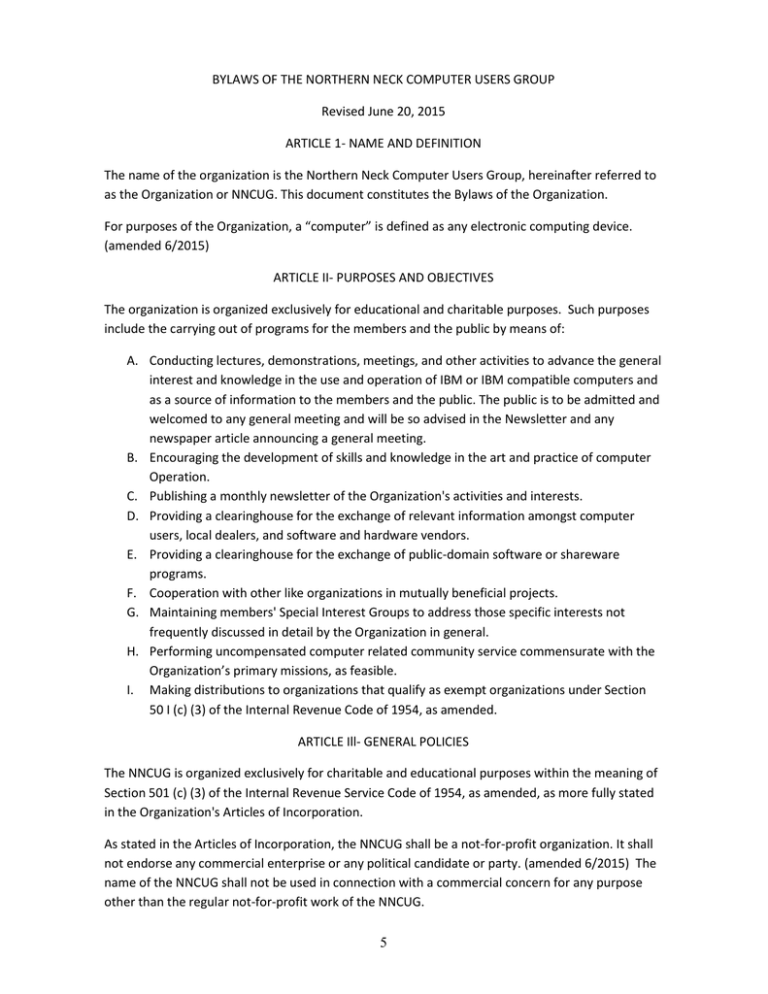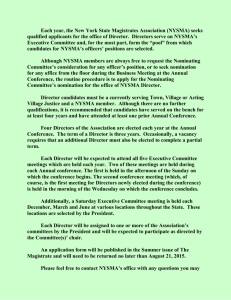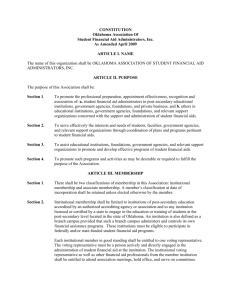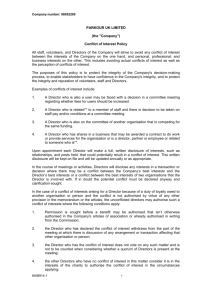By-Laws Revised 6-2015 - Northern Neck Computer Users Group
advertisement

BYLAWS OF THE NORTHERN NECK COMPUTER USERS GROUP Revised June 20, 2015 ARTICLE 1- NAME AND DEFINITION The name of the organization is the Northern Neck Computer Users Group, hereinafter referred to as the Organization or NNCUG. This document constitutes the Bylaws of the Organization. For purposes of the Organization, a “computer” is defined as any electronic computing device. (amended 6/2015) ARTICLE II- PURPOSES AND OBJECTIVES The organization is organized exclusively for educational and charitable purposes. Such purposes include the carrying out of programs for the members and the public by means of: A. Conducting lectures, demonstrations, meetings, and other activities to advance the general interest and knowledge in the use and operation of IBM or IBM compatible computers and as a source of information to the members and the public. The public is to be admitted and welcomed to any general meeting and will be so advised in the Newsletter and any newspaper article announcing a general meeting. B. Encouraging the development of skills and knowledge in the art and practice of computer Operation. C. Publishing a monthly newsletter of the Organization's activities and interests. D. Providing a clearinghouse for the exchange of relevant information amongst computer users, local dealers, and software and hardware vendors. E. Providing a clearinghouse for the exchange of public-domain software or shareware programs. F. Cooperation with other like organizations in mutually beneficial projects. G. Maintaining members' Special Interest Groups to address those specific interests not frequently discussed in detail by the Organization in general. H. Performing uncompensated computer related community service commensurate with the Organization’s primary missions, as feasible. I. Making distributions to organizations that qualify as exempt organizations under Section 50 I (c) (3) of the Internal Revenue Code of 1954, as amended. ARTICLE Ill- GENERAL POLICIES The NNCUG is organized exclusively for charitable and educational purposes within the meaning of Section 501 (c) (3) of the Internal Revenue Service Code of 1954, as amended, as more fully stated in the Organization's Articles of Incorporation. As stated in the Articles of Incorporation, the NNCUG shall be a not-for-profit organization. It shall not endorse any commercial enterprise or any political candidate or party. (amended 6/2015) The name of the NNCUG shall not be used in connection with a commercial concern for any purpose other than the regular not-for-profit work of the NNCUG. 5 The NNCUG shall not be affiliated with any manufacturer, distributor, outlet or provider of hardware, software, or professional services. The NNCUG assumes no responsibility or liability for the use of information, data, knowledge, materials, meeting facilities, or any other item, that it provides. The NNCUG supports all United States copyright laws. ARTICLE IV- MEMBERSHIP, DUES, AND PRIVILEGE OF MEMBERSIDP The membership of the NNCUG shall consist of those persons who are interested in the usage and operation of computers and related hardware and software. (Amended 6/2015) There shall be two classes of members: Voting members and family members. A. Voting Members shall be those who have paid all dues in full. B. Family Members shall be those who are the spouse or child (minor or adult) of a voting member whose name has been submitted to the Secretary as a family member. No dues shall be required of a Family Member. C. The privileges of Family Members are the same as those of Voting Members. D. Membership dues shall be $20.00 per annum. E. All members are entitled to receive all publications of the NNCUG (one per family), to be a member of Special Interest Groups, standing and working committees, and to participate in discussions prior to a vote at a general meeting. ARTICLE V- VOTING Voting shall be conducted on the basis of one vote per Voting Member. Voting for elected officials will be done by paper ballot, with safeguards taken to insure that: (I) only paid-up members vote, and (2) votes are secret: the only exception is when a complete slate of candidates, submitted by the nominating committee, is running unopposed, and under these circumstances the presiding official can accept a motion for casting a single unanimous ballot electing the slate of officers. If the motion is passed and approved by a majority vote by show of hands, the election will be consummated. Otherwise, election results shall be certified by three members picked at random by the current President and shall be recorded by the current Secretary. No vote results shall stand unless a quorum is present (a quorum consists of 25% of the current paid-up membership). ARTICLE VI- ELECTED OFFICERS, COMMITTEES, AND APPOINTED OFFICIALS Section I - General Information The Elected Officers of the Organization shall consist of the President, Vice-President, Secretary, Treasurer and a Member At Large. The board of Directors may elect additional officers at the discretion of the Board. The elected officers shall be elected for one-year terms April through March in accordance with the procedure in Article VII herein. (amended 6/2015 to remove term limits). Section 2 -Board of Directors- Ex Officio The Board of Directors shall consist of at least five members, with each member having one vote. A proposal is adopted by the Board if a majority approves. The membership shall elect the Board 6 of Directors ex officio by electing a President, Vice-President, Secretary, Treasurer and Member At Large by majority vote in accordance with the Bylaws. Immediately upon being elected to an elected office, the member elected shall be a Director by virtue of his/her elected office. The internal affairs of the Organization shall be managed by the Board of Directors in accordance with the Bylaws. Every member of the Board of Directors, now or in the future, shall serve without compensation for his/her services. The Board of Directors shall serve as an advisory board to the NNCUG membership, and is responsible for submitting proposals (including nominees for elected office and revisions to these Bylaws) for membership approval. A quorum for Board of Directors meetings shall consist of any three of five elected officers. A proposal is considered as adopted by the Board if a majority approves. Section 3 - Committees The President may appoint working committees for the purpose of conducting necessary business of the NNCUG. The President shall appoint and replace chairpersons of these committees. The organization of Standing Committees, such as Public Relations and Special Interest Groups, etc., shall require approval of the Board of Directors, and chairpersons shall be appointed by the President Section 4 -Duties of the Officers A. The President shall be responsible for presiding over the membership meetings, and for the administration of the affairs of the Organization, as established by the Board of Directors. The President is an ex officio member of all committees. B. The Vice-President shall act in the place of the President in his/her absence, and perform such other duties as the President may request C. The Secretary shall be responsible for maintaining active communications with the membership and others who may be interested in the activities of the Organization_ and shall maintain records of the Organization's activities, maintain the NNCUG's membership list, and have custody of any Organization seal. D. The Treasurer shall be responsible for, and is to account for; all revenues and expenditures, collecting all dues, developing the yearly budget, preparing a financial report to be included in the Annual Report, and such other interim financial reports as may be required by the Board of Directors. E. The Member At Large shall perform such duties as may be assigned by the Board. ARTICLE VII- ELECTIONS, VACANCIES AND REMOVAL Section I -Election Dates The elected officers shall be elected at the March Annual Meeting or, if a quorum was not present, at the next general meeting with a quorum present (a quorum consists of 25% of the current paidup membership). The elected officers shall take office on April of that year (or if later due to a lack of quorums) for a one-year (or less) term ending March 31 of the next year. Section 2 -Nominations and Eligibility 7 Nominations for elected officers shall be solicited from the membership at large in the January and February Newsletters. Also, nominations shall be taken from the floor at the January and February general meetings. All nominees must agree to serve if elected. Every member in good standing is eligible for each office. No member, however, may hold more than one elective office simultaneously. Section 3 -Election Procedure Being elected consists of receiving a plurality of the votes of Voting Members in good standing present for the election at which a quorum is present. Voting shall be conducted as a general vote pursuant to Article V herein. Up to two re-votes are permitted to break ties. If after two votes there is still a tie, the Board of Directors shall select one of the candidates as the winner. Section 4- Vacancy If the Office of the President is vacated, the Vice-President will fill the vacancy. In the event of any other elected officer vacancy, a special election will be held at the next general meeting with a quorum present, to fill out the remaining term The President shall fill appointed officer vacancies. Section 5 -Removals from Office An Elected Officer may be removed from office by a vote of two-thirds of the membership after proven malfeasance. ARTICLE VIII- FINANCES The current membership due of $20.00 per annum for Voting Members was determined by the membership at a general meeting. Future changes in membership dues shall be determined by the Board of Directors, approved by the membership by gener.al vote, and collected by the Treasurer. Approval of the budget by the Board of Directors constitutes authority for the Elected Officers to incur expenses, and for the Treasurer to distribute funds, up to the amount approved in the budget per line item. Disbursement for items not included in the budget, or in excess of the budget authorization, shall require approval by a majority of the Board of Directors. Organization funds may be withdrawn from the Organization's account(s) only over the signature of either of the following: the President or Treasurer, as designated with the bank. The Board of Directors approved the policy that at the end of the fiscal year the maximum amount of funds to be carried over shall not exceed $5,000.00. Any excess funds shall be distributed to appropriate charitable, educational or computer related community service organizations commensurate with the Organization's primary mission, as feasible. Upon dissolution of the Organization, its assets shall be distributed for one or more exempt purposes within the meeting of Section 50l(c)(3) of the Internal Revenue Code, as amended, as more fully stated in the Constitution, or shall be distributed to the Federal government or to a State or local government for a public purpose. ARTICLE IX- MEETINGS 8 General meetings shall be held monthly on a regular date as approved by the general membership. The general meeting in March shall be the Annual Meeting. At least ten (10) gener.al meetings shall be held annually. The membership shall be notified of the place m1d time of each meeting at least two days prior to the meeting. The notice for annual and special members meetings shall be given "no less than ten not more than sixty days before the date of the meeting." All meetings are open to the public. The Board of Directors shall meet as necessary. Board of Directors meetings shall be open to the membership. Only members of the Board of Directors shall have voting rights as such meetings. ARTICLE X- NEWSLETTER A Newsletter shall be published monthly by the Organization, and be distributed to the membership in advance of the next general meeting. The President may appoint a Newsletter Editor. The newsletter shall be sent to all members free of charge, and to any other relevant parties as determined by the President. The Newsletter shall be in the form of printed material or electronic media accessible by computer. ARTICLE XI- SPECIAL INTEREST GROUPS Any three members of the Organization may form a Special Interest Group for the purpose of pursuing any specific interest not specifically discussed by the membership in general. Special Interest Group objectives must be compatible with the Organization purposes and objectives. Such a group shall become an official Special Interest Group upon approval by the Board of Directors. The President may appoint a Special Interest Group Coordinator. ARTICLE XII- AMENDMENTS AND PARLIAMENTRY AUTHORITY These Bylaws as now approved by the Initial Directors shall be submitted to the current membership for comment and suggested amendments, if any, at a general meeting as soon as feasible. After the conclusion of the general meeting referred to in the preceding paragraph, any proposed amendments must be submitted to the Board of Directors in writing. Any member in good standing may do so. The Board of Directors shall formulate a recommendation to the membership. At the next general meeting following submission of the proposed amendment, and after notice to the general members, the amendment shall be discussed and approved or rejected in accordance with the procedure described in the next paragraph. These Bylaws shall be amended upon approval of a proposed amendment by a general vote of the majority of the voting members present at any meeting at which the Secretary determines that a quorum is present. Upon adoption of an amendment, the Secretary shall make the necessary change(s) to these Bylaws, and place a suitable notice of the change(s) in the Newsletter. The most current revision of Robert's Rules of Order shall serve as the Parliamentary Authority to decide all business for which a rule is not otherwise provided for in these Bylaws. 9








